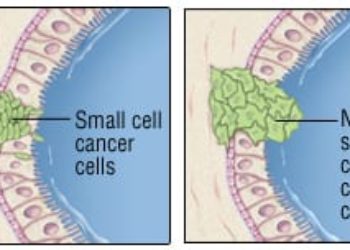Postoperative chemotherapy in chemosensitive patients undergoing surgical treatment of gastric cancer may prolong survival
1. Preoperative chemosensitivity was significantly associated with improved survival following receipt of surgery and adjuvant chemotherapy.
2. Amongst patients with chemosensitive gastric adenocarcinoma, median 5-year survival was 73.8% in those who received chemotherapy after surgery and was 65% in those who underwent surgery alone.
Evidence Rating Level: 2 (Good)
Study Rundown: Gastric adenocarcinoma remains an aggressive form of cancer with poor survival in North America, often despite resection. The standard of care for early-stage gastric cancer is surgery and perioperative chemotherapy. However, only a fraction of patients achieve pathologic response to preoperative chemotherapy, and after surgery patients are often unable to tolerate a full course of postoperative chemotherapy. The present study hypothesized that receipt of postoperative chemotherapy would improve survival in the subset of gastric adenocarcinoma patients who were sensitive to chemotherapy preoperatively. A large cohort of 2382 patients with resectable gastric adenocarcinoma were eligible for this study. 1483 (62%) were considered refractory to preoperative chemotherapy, while 727 (31%) were sensitive and 172 (7%) were very sensitive. The primary outcome was survival following surgery, and the sample was divided into cohorts based on receipt of postoperative chemotherapy; median follow-up time was 34 months. Overall, preoperative chemosensitivity was significantly associated with improved survival following receipt of surgery and adjuvant chemotherapy. Patients with refractory disease had the worst survival compared to those who were sensitive to preoperative chemotherapy. The receipt of postoperative chemotherapy did not improve survival in the entire cohort, but rather only in patients considered ‘sensitive’ to preoperative chemotherapy. This retrospective cohort study by Deng et al identified a subset of patients with gastric adenocarcinoma who may accrue survival benefit from receiving chemotherapy before and after surgery. Further study using prospective methodology should be pursued to better characterize the notion that preoperative chemosensitivity is a predictor of improved survival following postoperative chemotherapy as described here. Some strengths of this study include the large sample size and the development of novel means for personalized cancer therapy. However, the stringent eligibility criteria (i.e., no comorbidities) reduce the external validity of this study, and the authors were unable to control for confounding with the retrospective study design.
Click to read this study in JAMA
Relevant Reading: Recurrence after preoperative chemotherapy and surgery for gastric adenocarcinoma: a multicentre study
In-Depth [retrospective cohort study]: Study data from the National Cancer Database in the United States were used. Adult patients with Stage II or III gastric adenocarcinoma, who had undergone preoperative chemotherapy and resection with negative margins were eligible for inclusion in the study cohort. Patients who died within 90 days of surgery were excluded in order to avoid immortal time bias and to account for surgical complications leading to death within the acute postoperative period. Sensitivity to preoperative chemotherapy was defined according to pathological response: very sensitive (ypT0N0), sensitive (pathological less than clinical TNM stage, excluding ypT0N0), and refractory (pathological greater than or equal to clinical TNM stage). The following factors reduced the likelihood of receiving postoperative chemotherapy: older age (odds ratio [OR], 0.99; 95% confidence interval, 0.97-1.00), comorbidity (0.71; 0.57-0.90), longer time between preoperative chemotherapy and surgery (0.99; 0.97-1.00), refractory to preoperative chemotherapy (OR versus very sensitive, 0.58; 0.37-0.89), and longer stay in hospital (0.95; 0.93-0.97). Postoperative chemotherapy was associated with improved survival in patients who were sensitive to preoperative chemotherapy (Cox hazard ratio 0.64, 95% confidence interval 0.46-0.91). The overall survival of patients each year after surgery was 97.6% at 1 year, 83.1% at 3 years, and 73.8% at 5 years in patients who had received postoperative chemotherapy, and 94.9% at 1 year, 77.2% at 3 years, and 65.0% at 5 years in those who did not.
Image: PD
©2021 2 Minute Medicine, Inc. All rights reserved. No works may be reproduced without expressed written consent from 2 Minute Medicine, Inc. Inquire about licensing here. No article should be construed as medical advice and is not intended as such by the authors or by 2 Minute Medicine, Inc.









